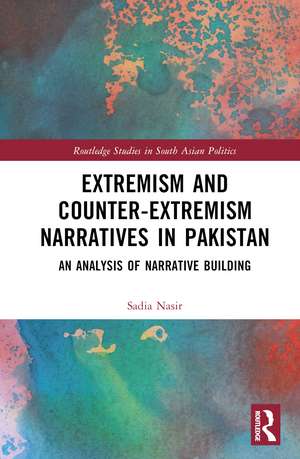Extremism and Counter-Extremism Narratives in Pakistan: An Analysis of Narrative Building: Routledge Studies in South Asian Politics
Autor Sadia Nasiren Limba Engleză Hardback – 19 mai 2023
| Toate formatele și edițiile | Preț | Express |
|---|---|---|
| Paperback (1) | 385.80 lei 6-8 săpt. | |
| Taylor & Francis – 9 oct 2024 | 385.80 lei 6-8 săpt. | |
| Hardback (1) | 1000.30 lei 6-8 săpt. | |
| Taylor & Francis – 19 mai 2023 | 1000.30 lei 6-8 săpt. |
Din seria Routledge Studies in South Asian Politics
-
 Preț: 281.98 lei
Preț: 281.98 lei -
 Preț: 310.55 lei
Preț: 310.55 lei - 8%
 Preț: 389.70 lei
Preț: 389.70 lei - 18%
 Preț: 260.07 lei
Preț: 260.07 lei -
 Preț: 387.20 lei
Preț: 387.20 lei -
 Preț: 386.39 lei
Preț: 386.39 lei - 17%
 Preț: 259.98 lei
Preț: 259.98 lei -
 Preț: 389.66 lei
Preț: 389.66 lei - 17%
 Preț: 257.28 lei
Preț: 257.28 lei - 18%
 Preț: 1000.27 lei
Preț: 1000.27 lei -
 Preț: 389.38 lei
Preț: 389.38 lei -
 Preț: 436.14 lei
Preț: 436.14 lei - 17%
 Preț: 190.88 lei
Preț: 190.88 lei - 16%
 Preț: 260.33 lei
Preț: 260.33 lei - 19%
 Preț: 256.32 lei
Preț: 256.32 lei -
 Preț: 453.41 lei
Preț: 453.41 lei -
 Preț: 411.42 lei
Preț: 411.42 lei - 26%
 Preț: 764.20 lei
Preț: 764.20 lei -
 Preț: 444.62 lei
Preț: 444.62 lei - 31%
 Preț: 767.07 lei
Preț: 767.07 lei - 19%
 Preț: 258.70 lei
Preț: 258.70 lei - 26%
 Preț: 764.94 lei
Preț: 764.94 lei -
 Preț: 389.66 lei
Preț: 389.66 lei - 19%
 Preț: 271.82 lei
Preț: 271.82 lei -
 Preț: 389.66 lei
Preț: 389.66 lei - 18%
 Preț: 1000.87 lei
Preț: 1000.87 lei - 18%
 Preț: 998.71 lei
Preț: 998.71 lei -
 Preț: 449.41 lei
Preț: 449.41 lei -
 Preț: 382.65 lei
Preț: 382.65 lei - 12%
 Preț: 299.52 lei
Preț: 299.52 lei - 26%
 Preț: 820.56 lei
Preț: 820.56 lei - 26%
 Preț: 763.61 lei
Preț: 763.61 lei
Preț: 1000.30 lei
Preț vechi: 1219.88 lei
-18% Nou
191.40€ • 199.84$ • 158.41£
Carte tipărită la comandă
Livrare economică 05-19 aprilie
Specificații
ISBN-10: 1032478802
Pagini: 196
Ilustrații: 2 Tables, black and white; 2 Line drawings, black and white; 4 Halftones, black and white; 6 Illustrations, black and white
Dimensiuni: 156 x 234 x 13 mm
Greutate: 0.45 kg
Ediția:1
Editura: Taylor & Francis
Colecția Routledge
Seria Routledge Studies in South Asian Politics
Locul publicării:Oxford, United Kingdom
Public țintă
PostgraduateCuprins
Introduction; Chapter 1: Conceptual And Theoretical Framework; Chapter 2: Extremism And Extremist Narrative Building In Pakistan; Chapter 3: Counter-Extremism Narratives In Pakistan; Chapter 4: Counter-Narratives And Socio-Political Reality; Chapter 5: Towards Building Comprehensive Counter-Narratives: Reflections And Suggestions; Conclusion; Appendices
Notă biografică
Sadia Nasir is an Islamabad-based independent researcher and adjunct faculty at Bahria University, Pakistan.
Recenzii
-Ishtiaq Ahmed, Member Planning Commission and former VC Sargodha University, Pakistan
[This book ventures into largely unexplored territory, shedding light on the pivotal role of narratives in fuelling various forms of extremism within the country. Using a comprehensive theoretical framework that amalgamates Aristotle’s rhetoric, securitization theory and constructivism, Sadia Nasir meticulously examines extremist and counterextremist narratives. Focusing on the realm of ideas, Nasir provides valuable insights for combating the growing radicalization and its alarming consequences, with the goal of building a more resilient and peaceful Pakistan. [...] Nasir’s systematic analysis is a vital reference for students and scholars interested in south Asia, particularly Pakistan. Policy-makers interested in the region will also find this book beneficial.
-Zhou Li, Southwest Jiaotong University, China, International Affairs 99: 6, 2023
Descriere
The book provides an extensive analysis of extremism, extremist narratives and counter-narratives and their role in consolidating exclusive religious, cultural and social identities in Pakistan.
Focusing on the construction and institutionalization of extremist tendencies, the book studies the process of the adoption of the narrow interpretation of religion and society, which subsequently was equated with national identity. It looks at the efforts of counter-extremism narratives, which tend to focus on violent extremism while overlooking non-violent manifestations. The author highlights that the main issue with counter-narratives is the difficulty in presenting extremism and its narratives as a threat since they have been normalized with the state being part of facilitating and building them.
A valuable and much-required contribution to the existing literature on extremism and narrative building in Pakistan, this book would help students, academics and policymakers in identifying the limitations of counter-narratives in Pakistan, while providing them with a detailed overview of extremism and extremist narratives. It will also be of interest to researchers studying Security Studies and Asian Politics, especially in the context of South Asia.
